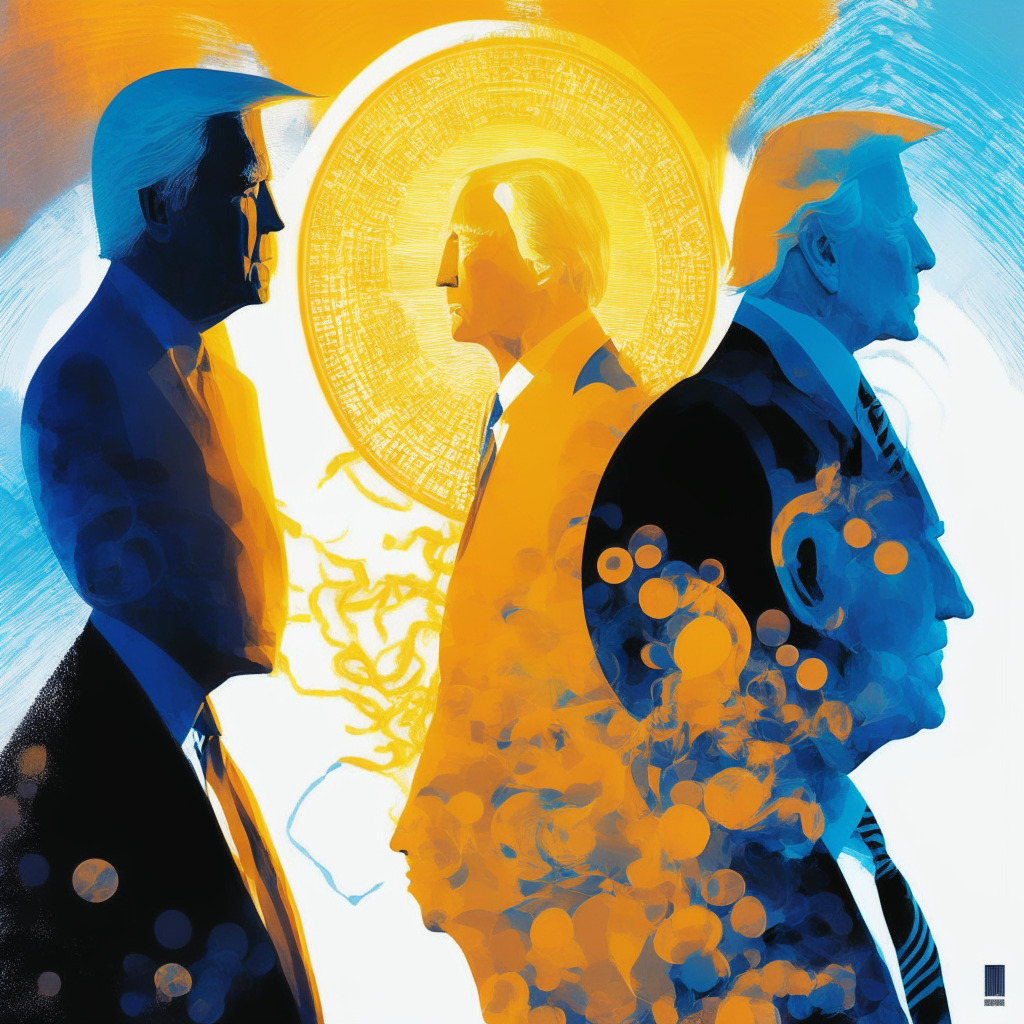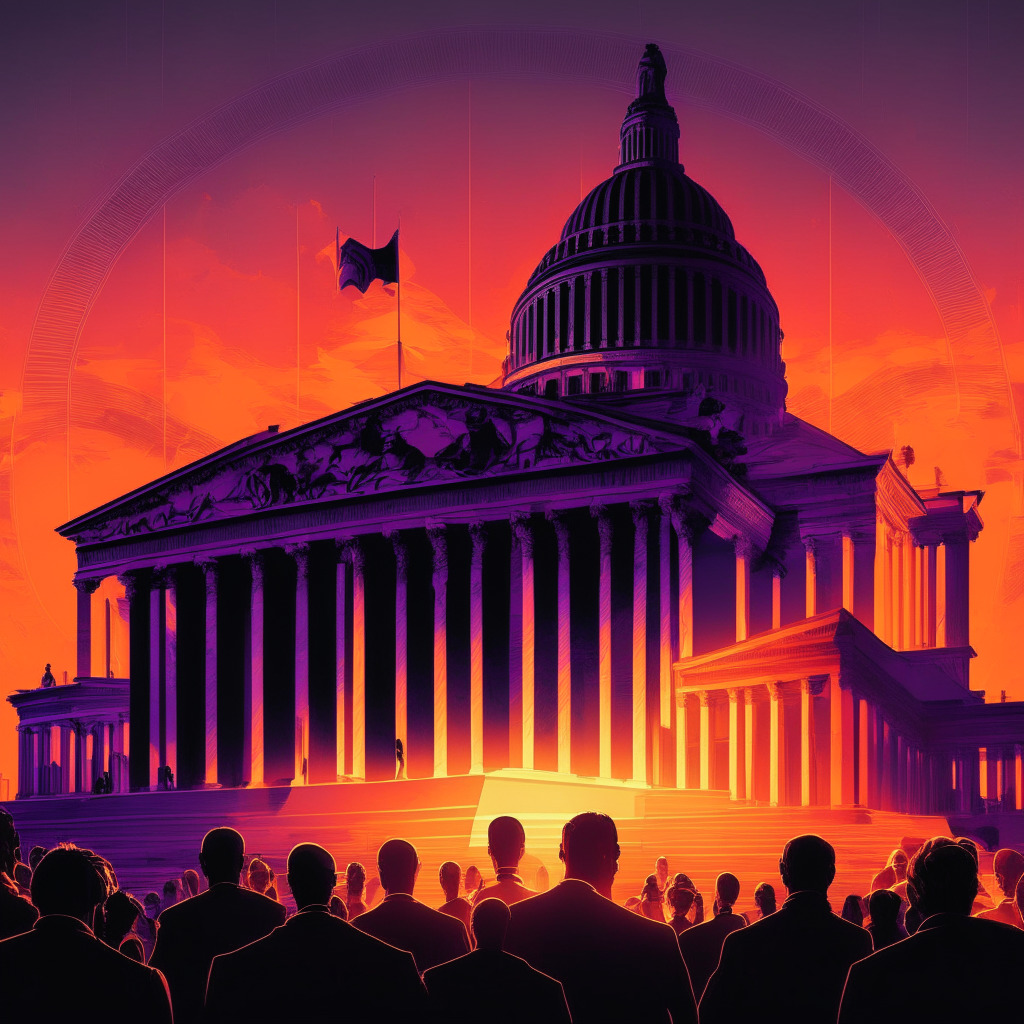Pro-Bitcoin candidate Francis Suarez has entered the 2024 US presidential race, stirring buzz within the crypto community. While the Miami mayor’s pro-crypto stance excites enthusiasts, regulatory scrutiny around digital currencies raises questions about the feasibility of his policies.
Search Results for: Francis Suarez
Miami’s Blockchain Mayor Bows Out: What Suarez’s Presidential Campaign Suspension Means for Cryptocurrency Future
“Suarez, Miami’s Mayor, known for his bitcoin-friendly stance, accepted bitcoin as campaign donation and has explored the use of blockchain technology. Despite facing challenges, his pursuit of these technologies prompts discussion on the role of digital currencies in future political campaigns and public administration.”
Bitcoin Donations and MiamiCoin: Mayor Suarez’s Crypto-Political Strategy Unveiled
“Miami’s Bitcoin-friendly mayor, Francis Suarez, confirms on Coindesk TV that his presidential campaign would welcome Bitcoin donations. Despite the rocky journey of MiamiCoin, Suarez remains dedicated to cryptocurrencies, envisioning their potential to reshape wealth distribution in America.”
Regulating Crypto – Exploring Opportunities and Risks Amidst Politics, Real Estate and Federal Policies
“Miami Mayor, Francis Suarez, continues to push for crypto adoption, advocating for Bitcoin compensation. Meanwhile, Bitcoin-powered real estate opportunities emerge in the Cayman Islands. As for Bitcoin’s future price, a potential value of $27,400 is suggested, with an optimistic rise to $30,300, or a bearish plunge to $24,100.”
Miami Mayor Launches Presidential Bid accepting Bitcoin Donations Amid CBDC Criticisms
“Miami Mayor Francis Suarez, a champion of cryptocurrencies, announced his presidential campaign will accept Bitcoin donations. Suarez criticized the Biden administration’s cryptocurrency management and expressed disdain for the concept of central bank digital currencies, pledging to ban them if elected. Despite setbacks, he continues emphasizing the importance of crypto familiarity in government leadership.”
Bitcoin’s Reduced Trading Volume and Potential Impact on Future Market Dynamics
Bitcoin’s daily trading volume has noticeably decreased, contributing to a stagnant price around $30k. Meanwhile, mainstay acceptance grows as politicians, like potential 2024 presidential candidate Francis Suarez, begin accepting cryptocurrency donations. Analytic indices predict a bearish Bitcoin future, with possible decline to $28.2k.
Cryptocurrency Enters US Presidential Race: Will It Define Campaign Platforms?
The upcoming US presidential elections feature candidates recognizing cryptocurrency potential in their platforms. Miami’s pro-bitcoin mayor Francis Suarez and Democratic candidate Robert F. Kennedy Jr. discuss embracing digital assets, while Republican candidate Sen. Tim Scott aims to develop a framework for them. This shift highlights digital currencies’ growing prominence in political strategy and future campaigns.
Miami’s Cooling Crypto Enthusiasm: A Reality Check or Missed Opportunities?
Amid a bearish crypto market, Miami and Mayor Francis Suarez appear to be losing enthusiasm for cryptocurrencies and blockchain technology. Once aiming to make Miami a leading crypto hub, recent events like the MiamiCoin trading halt, FTX Arena renaming, and Blockchain.com canceling its office relocation reflect a shift in the city’s crypto landscape.
The New ‘Crypto-politics’: Pros and Cons of Accepting Cryptocurrency Donations in Political Campaigns
“Florida’s Governor, Ron DeSantis, plans to announce the acceptance of crypto donations for his 2024 campaign, an interesting turn from traditional funding. However, cryptocurrency donations introduce complexity regarding traceability and potential misuse. The political landscape’s inherent unpredictability combined with cryptocurrency’s volatility invite intriguing consequences.”
Grayscale’s Victory: A Mixed Blessing for the Crypto Industry? Unraveling the Consequences
The District of Columbia Circuit Court of Appeals overturned the SEC’s rejection of Grayscale Investments’ Bitcoin spot ETF application, a victory that many crypto enthusiasts celebrated. However, this decision could invite substantial ‘Big Money’ to the crypto table, introduce new challenges, and potentially incite backlash from SEC. It’s suggested to stay prepared for the uncertain future of crypto regulations.
Crypto Regulation: Candidates’ Stances and Upcoming Election Implications
“Crypto regulation has become a significant issue in U.S. presidential campaigning. Candidates’ positions vary widely, from skepticism to enthusiastic adoption, yet the subject of digital assets regulation was absent from the recent Republican debate. This highlights the increasing importance of cryptocurrencies in our socio-political landscape, and suggests a need for informed legislation.”
Former President Trump’s Surprising Foray into Cryptocurrency and NFTs: A Paradigm Shift or Sheer Opportunism?
“Former US President Donald Trump reportedly owns digital assets worth between $250,000 and $500,000, largely boosted by sales from his NFT trading cards. This comes despite previous comments disparaging cryptocurrencies. Trump’s decision amidst divisive views on digital assets could potentially influence the upcoming White House bid for 2024.”
Navigating Blockchain: Innovations, Challenges, and the Intriguing Future of Cryptocurrency
“A telling report by Glassnode indicates that long-term crypto holders are showing tenacity, with Coinbase and Binance creating waves in the sector. Coinbase launched its Ethereum layer-2 blockchain, whereas Binance became the first fully licensed crypto exchange in El Salvador.”
Navigating Crypto’s Role in Political Fundraising: A New Dawn or Regulatory Nightmare?
The California Fair Political Practices Commission issued new rules for political aspirants accepting crypto donations, outlining specific procedures to ensure transparency and accountability. Crypto donations are becoming common in campaigns, though with stipulations around anonymous donors and exchange agreements. Regulations also cover advertising disclosures, contribution limits, and more.
2024 U.S. Presidency & Crypto: Favouring Central Bank Digital Currencies or Upholding Bitcoin?
“According to Grayscale, presidential candidates Joe Biden and Donald Trump might support the development of central bank digital currency (CBDC), despite their unclear stance on Bitcoin. Other candidates have expressed both support for cryptocurrencies and opposition to CBDCs. Amidst this, regulatory uncertainty tests the resilience of crypto firms and generates various views about the future of cryptocurrencies.”
Campaign Promises and Crypto: How Political Stances May Shape the Future of Bitcoin
Florida Governor Ron DeSantis, during his 2024 presidential campaign, vowed to prohibit central bank digital currencies (CBDCs) and suppress any policy by the current Biden’s administration pertaining to Bitcoin and cryptocurrency regulation. The move has sparked renewed conversations about digital currencies in the political sphere.
Could Bitcoin Decide the Next President? Exploring Cryptocurrency’s Growing Political Influence
“Bitcoin and the crypto community could be deciding factors in a U.S. presidential election. Candidates now need to proclaim their stance on cryptocurrencies. The U.S. Federal Reserve estimates that 8%-11% of the American population, owning cryptocurrencies, can considerably influence the election. Anti-Bitcoin policies may thus, alienate a rapidly growing cohort of voters.”
Crypto Holdings of Public Figures: Transparency, Profit, and the Uncertain Landscape
NYC Mayor Eric Adams, a well-known crypto advocate, faced confusion about his cryptocurrency holdings. Adams’ plans to make NYC a crypto hub include accepting his initial mayoral salary in Bitcoin and Ether. Amid the important conversation about political figures’ transparency with their cryptocurrency investments, the mayor’s activities raise questions about the relationship between advocating for crypto and personal financial gain.
Bitcoin’s Struggle to Find Support above $24k amidst Economic Turbulence & Miami Mayor’s Crypto Plans
The recent 5% drop in Bitcoin’s price raises concerns about market stability and the crucial $24,000 support level. This follows a hawkish statement from the Federal Reserve and a turbulent week for cryptocurrencies, with the next support level at $24,350.
Crypto Enthusiast Mayor’s Presidential Bid: A Push for Blockchain or Risky Move?
Miami’s “Bitcoin Mayor” Francis X. Suarez has filed to run for U.S. presidency, which could stimulate growth and adoption of digital currencies and blockchain-based services. His presidential bid may prompt a profound conversation on cryptocurrency’s role in shaping America’s economy, but also raise concerns about potential risks, vulnerabilities, and conflicts of interest.
2024 US Election and Crypto: Regulation vs Innovation Showdown
The US cryptocurrency regulatory stance becomes a significant topic as the 2024 presidential election approaches, with figures like Florida Governor Ron DeSantis discussing the possibility of banning CBDC use in Florida. The current administration’s enforcement actions, ongoing lawsuits, and heavy regulation could hinder innovation and force businesses to seek more open environments outside the US.




















